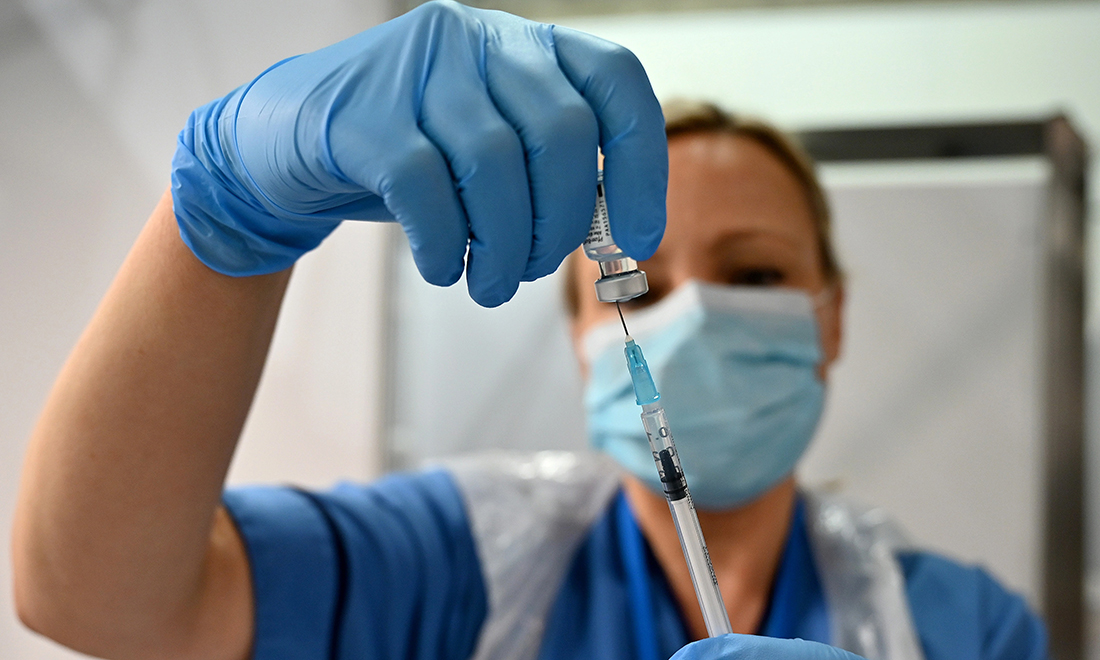
英国人口的高抗体保护率正在下降。业界警告称,进入“危险”的冬季时,英国人口的免疫力将达不到抵抗新冠病毒的水平。
英国国家统计局(Office for National Statistics)在今年8月10日公布的最新数据显示,体内病毒抗体水平较高的人数迅速减少。
根据英国国家统计局的标准,高水平抗体是指每毫升血液中抗体超过800纳克(ng)。
英国国家统计局的最新数据显示,在7月11日至7月17日期间,拥有高水平抗体的英国人占总人口的71.7%,与一周前相比减少了1.4%。
相关数据样本来自英国16岁以上的10,234人。
全英国的情况基本相似,苏格兰、威尔士和北爱尔兰拥有高水平抗体的人数占比也在下降。
英国国家统计局的研究从2020年12月开始,当时英国成年人中只有0.7%抗体水平较高。
数据显示,今年3月英国拥有高水平抗体的人数达到峰值,当时英格兰82%的人口抗体保护水平较高。
8月10日的数据显示,英格兰各地拥有高水平抗体的人数较3月的峰值下降了12%。
英国国家统计局指出,5月曾经调整研究方法。然而,数据的趋势与之前保持一致。
同时数据显示,英国设定的抗体基准水平为每毫升血液至少含179纳克抗体,该标准在德尔塔变异病毒高峰时期确定,人数相对稳定。抗体达到基准水平的人群比例与前一周相比保持不变,而且自3月中旬以来几乎没有变化。
未来的“危险”时期
2020年12月,英国是全世界第一个临床试验后实际接种新冠疫苗的国家,英国向所有成年人推广加强针计划之后,3月英国人群抗体水平达到高峰。
今年春天,75岁以上和免疫系统较弱的人群可以注射第二针加强针。
在英国12岁以上的人群里,共87.9%接种了两剂新冠疫苗。每10人就有7人注射过加强针。
虽然英国制定计划秋季为某些人群(包括50岁以上的人、一线医护人员和免疫功能不全者)提供加强针,但尚未宣布向更广泛人群提供额外加强针。
《财富》杂志就此联系了英国政府发言人,该发言人并未立即发表评论。
8月11日,伦敦医学实验室(London Medical Laboratory)的首席测试专家兼首席科学官昆顿·菲韦尔曼博士在新闻稿中表示,进入“危险的冬季”时,人们体内需要保持较高的抗体水平。
“英国新冠抗体较高的人数大幅下降12.7%,显然令人担心。”他说。
菲韦尔曼补充称,现在英国新冠抗体防护水平较高的人数可能已经不到70%。
“简单说点事实,如果拥有高水平抗体的人数继续加速减少,第一批英国成年人就又要等到10月才开始注射加强针,届时高水平抗体人群占比将只有60%。”他警告道。
菲韦尔曼告诉《财富》杂志,伦敦医学实验室的研究表明,接种疫苗三个月后产生的免疫力就会大幅下降。他补充说,无论接种哪种疫苗情况都一样。
“越发让人担心的是,新的奥密克戎BA.4和BA.5亚型产生的免疫应答不如之前的变异,因此再次感染的可能性加大。”他说。“保持高水平抗体对于压制病毒、防止感染和控制病毒传播至关重要。”
菲韦尔曼的评论也呼应了此前美国的顶尖医学专家安东尼·福奇的警告,福奇曾经表示,如果有人在秋冬季节还未及时接种新冠疫苗,就会“有麻烦”。(财富中文网)
译者:梁宇
审校:夏林
英国人口的高抗体保护率正在下降。业界警告称,进入“危险”的冬季时,英国人口的免疫力将达不到抵抗新冠病毒的水平。
英国国家统计局(Office for National Statistics)在今年8月10日公布的最新数据显示,体内病毒抗体水平较高的人数迅速减少。
根据英国国家统计局的标准,高水平抗体是指每毫升血液中抗体超过800纳克(ng)。
英国国家统计局的最新数据显示,在7月11日至7月17日期间,拥有高水平抗体的英国人占总人口的71.7%,与一周前相比减少了1.4%。
相关数据样本来自英国16岁以上的10,234人。
全英国的情况基本相似,苏格兰、威尔士和北爱尔兰拥有高水平抗体的人数占比也在下降。
英国国家统计局的研究从2020年12月开始,当时英国成年人中只有0.7%抗体水平较高。
数据显示,今年3月英国拥有高水平抗体的人数达到峰值,当时英格兰82%的人口抗体保护水平较高。
8月10日的数据显示,英格兰各地拥有高水平抗体的人数较3月的峰值下降了12%。
英国国家统计局指出,5月曾经调整研究方法。然而,数据的趋势与之前保持一致。
同时数据显示,英国设定的抗体基准水平为每毫升血液至少含179纳克抗体,该标准在德尔塔变异病毒高峰时期确定,人数相对稳定。抗体达到基准水平的人群比例与前一周相比保持不变,而且自3月中旬以来几乎没有变化。
未来的“危险”时期
2020年12月,英国是全世界第一个临床试验后实际接种新冠疫苗的国家,英国向所有成年人推广加强针计划之后,3月英国人群抗体水平达到高峰。
今年春天,75岁以上和免疫系统较弱的人群可以注射第二针加强针。
在英国12岁以上的人群里,共87.9%接种了两剂新冠疫苗。每10人就有7人注射过加强针。
虽然英国制定计划秋季为某些人群(包括50岁以上的人、一线医护人员和免疫功能不全者)提供加强针,但尚未宣布向更广泛人群提供额外加强针。
《财富》杂志就此联系了英国政府发言人,该发言人并未立即发表评论。
8月11日,伦敦医学实验室(London Medical Laboratory)的首席测试专家兼首席科学官昆顿·菲韦尔曼博士在新闻稿中表示,进入“危险的冬季”时,人们体内需要保持较高的抗体水平。
“英国新冠抗体较高的人数大幅下降12.7%,显然令人担心。”他说。
菲韦尔曼补充称,现在英国新冠抗体防护水平较高的人数可能已经不到70%。
“简单说点事实,如果拥有高水平抗体的人数继续加速减少,第一批英国成年人就又要等到10月才开始注射加强针,届时高水平抗体人群占比将只有60%。”他警告道。
菲韦尔曼告诉《财富》杂志,伦敦医学实验室的研究表明,接种疫苗三个月后产生的免疫力就会大幅下降。他补充说,无论接种哪种疫苗情况都一样。
“越发让人担心的是,新的奥密克戎BA.4和BA.5亚型产生的免疫应答不如之前的变异,因此再次感染的可能性加大。”他说。“保持高水平抗体对于压制病毒、防止感染和控制病毒传播至关重要。”
菲韦尔曼的评论也呼应了此前美国的顶尖医学专家安东尼·福奇的警告,福奇曾经表示,如果有人在秋冬季节还未及时接种新冠疫苗,就会“有麻烦”。(财富中文网)
译者:梁宇
审校:夏林
Rates of high antibody protection are declining in the U.K., prompting warnings that the population will have insufficient immunity levels as it heads into the “dangerous” winter months.
Published on August 10, new figures from Britain’s Office for National Statistics (ONS) revealed that the number of people with a high level of antibodies against the virus was rapidly dwindling.
Anything above 800 nanograms (ng) of antibodies per milliliter of blood is considered a high level, according to the ONS.
The organization’s latest data revealed that 71.7% of the English population had this high level of antibodies between July 11 and July 17—marking a 1.4% decline from a week earlier.
The data included samples from 10,234 people over the age of 16 living in England.
The picture was similar across Britain, with high antibody rates also declining in Scotland, Wales, and Northern Ireland.
The ONS research dates back to December 2020, when it found that just 0.7% of English adults had high antibody levels.
High antibody levels peaked in March this year, according to the data, when 82% of England’s population had high antibody protection.
August 10’s data marked a 12% decline from the March peak in high antibody levels across England.
The ONS noted on Wednesday that its methodology for the study changed in May. However, the trend in the data continued as before.
Meanwhile, the data showed that the U.K.’s baseline antibody level of at least 179 ng per ml of blood—which had been set at the height of the Delta wave of the pandemic—had held firm, with the proportion of the population with this level of antibodies remaining unchanged from a week earlier and showing little change from mid-March.
“Dangerous” times ahead
The U.K. was the first country in the world to administer doses of coronavirus vaccines outside of clinical trials in December 2020, and the peak in high antibody levels seen in March came after the country’s booster program was rolled out to all adults.
People over the age of 75 and those with weakened immune systems became eligible for a second booster dose in the spring of this year.
A total of 87.9% of people in the U.K. over the age of 12 have received two doses of a COVID vaccine. Seven in 10 have had a booster shot.
While there are plans for an autumn booster program for certain individuals in Britain, including the over-fifties, frontline health care workers, and the immunosuppressed, no plans have been announced to extend the additional booster doses to the wider population.
A spokesperson for the U.K. government was not immediately available for comment when contacted by Fortune.
Dr. Quinton Fivelman, lead testing expert and chief scientific officer at London Medical Laboratory, said in a press release on August 11 that populations needed to retain a substantial number of antibodies as they entered “the dangerous winter months.”
“This dramatic 12.7% decrease in the number of people in England with a significant number of antibodies to COVID is obviously concerning,” he said.
Fivelman added that less than 70% of people in Britain were now likely to have high levels of antibody protection against COVID-19.
“The simple truth is that, if this rate of decline continues to accelerate and the first U.K. adults don’t start receiving their boosters until October, only 60% of the population will retain substantial antibodies by the time they are jabbed,” he warned.
Fivelman told Fortune that London Medical Laboratory’s research indicated vaccine-derived immunity waned substantially once three months had passed since vaccination. This was true regardless of which vaccine an individual received, he added.
“One developing concern is that the new Omicron BA.4 and BA.5 subvariants do not produce as high an immune response as the previous strains, so reinfection is more likely to occur,” he said. “Higher levels of antibodies are important to neutralize the virus, stopping infection and limiting people transmitting the virus to others.”
Fivelman’s comments echo a warning from America’s top doctor Anthony Fauci last week that anyone who was not up to date with their COVID vaccinations heading into the fall and winter months was “going to get into trouble.”






